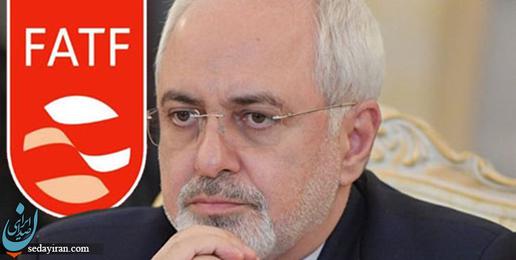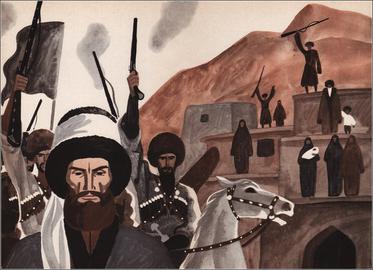Iran’s Foreign Minister Mohammad Javad Zarif has conceded that money laundering is a continuing problem in Iran, and that some of the biggest profits are being made by people with close links to the regime.
“Widespread money laundering in Iran is a fact,” Zarif announced on Sunday, November 11 during an interview with Khabar Online. Following the statement, he almost immediately came under attack by the media close to the Revolutionary Guards and a number of members of the parliament.
In the interview, Zarif said there were people who were exchanging trillions of tomans in Iran, and who fought against anti-money laundering legislation behind the scenes. [Persian video]. In one case, one of them laundered 30 billion tomans, around $72 million, he said, “so they have the financial means to spend an amount equal to the budget of the Foreign Ministry for a single deceitful propaganda campaign.”
Zarif was careful enough to repeat that he was not accusing any particular government entity. But he did reiterate his statements about the amount of money being transferred illegally and without transparency: “The whole budget of the Foreign Ministry is 1.1 trillion tomans [close to $262 million] and this is less than the budget of a number of cultural entities that are connected to some powerful organs. We cannot compete with their propaganda campaigns.”
In response, Mohsen Mehdian at Fars News Agency, an affiliate of the Revolutionary Guards, wrote: “A few weeks ago Zarif brought up the same sort of accusations in a private meeting with media directors.”
The Cost of Money Laundering
Details of the meeting Mehdian mentioned have not been made public, but on October 7, in an interview with the newspaper Ebtekar, reformist member of the parliament Mahmoud Sadeghi accused people who opposed the fight against money laundering of trying to protect their own “irregular” financial transactions. “According to the statistics by the president’s legal deputy, the annual financial circulation of Iran’s economy is $150 billion,” he said. “Of this amount, $100 billion is the revenue and $50 billion goes to imports. Because this circulation does not go through regular banking channels, it costs us 10 percent. We must pay $15 billion for going through irregular channels. Some opponents of the bill to join the CFT [International Convention for the Suppression of the Financing of Terrorism] are worried about a reduction in the percentages that they receive.”
On November 12, Pedram Soltani, Deputy President of Iran’s Chamber of Commerce, offered his own estimates of what money laundering was costing the country. Posting on Twitter, he said 20 trillion tomans (approximately $4.8 billion) could be attributed to fuel smuggling, five trillion tomans ($1.2 billion) to drug trafficking, 10 trillion tomans to the smuggling of merchandize ($2.4 billion) and 10 trillion tomans to the underground economy ($2.4 billion).
Zarif’s comments attracted widespread attention from hardliners. In the 24-hour-period following the interview, Fars News Agency, Mashregh News, Hossein Shariatmadari, the managing editor of the daily Kayhan, and Ahmad Amirabadi, a hardliner member of the parliament’s Steering Committee, all published harsh criticism targeting the foreign minister.
Zarif “Wants more Sanctions”
The Mashregh News website said Zarif’s statements were an indication that he was “leaning toward more sanctions on Iran.” And Hossein Shariatmadari wrote that Zarif’s failure to reveal who is involved in money laundering “would mean treason against the people and the regime and collaboration with the money launderers.” He also pointed a finger at the government and asked: “What kind of a government is this where billions are money laundered within its banking system and this system is powerless to find out about it?”
Steering Committee member Amirabadi described Zarif’s statements as a “big slander” against the regime of the Islamic Republic. “These statements means [he is] playing for the enemies,” he said. And Alireza Salimi, another member of the parliament, accused Zarif of psychological warfare against the people, and said he was trying to scare them.
The three critics also pointed out that during a speech at Tehran University, Zarif had said that the US could wipe out all of Iran’s military installation with one bomb, saying it was an example of his habit of making statements against the interests of the Islamic Republic.
A “Counter-Revolutionary”
Javad Karimi Ghoddousi, the conservative representative from Mashhad, went even further. He labeled Zarif a “counter-revolutionary” and said he “must be prosecuted by security agencies and especially by the secretariat of the Supreme National Security Council for making statements against national security.”
Ghoddousi also claimed that Zarif wanted to resign from the foreign ministry and that he is questioning “the achievements of the Islamic Revolution” in the final moments of his political life. Therefore, he claimed, “we have to quickly gather a considerable number of signatures [from members of the parliament] to present the bill to impeach Zarif.” And on November 12, Tasnim News Agency reported that a number of members of the parliament were gathering signatures to question him about his claim that money laundering in Iran is widespread.
Related Coverage:
Iran Finally Signs Convention for the Suppression of the Financing of Terrorism, October 8, 2018
Iran’s Medicine Shortage: More About Corruption and Mismanagement Than Sanctions, September 7, 2018
Our Economy is Corrupt to the Core. No, It’s Even Worse!, August 27, 2018
Money Laundering and Terrorism: Rouhani vs the Revolutionary Guards, September 7, 2016
visit the accountability section
In this section of Iran Wire, you can contact the officials and launch your campaign for various problems

























comments